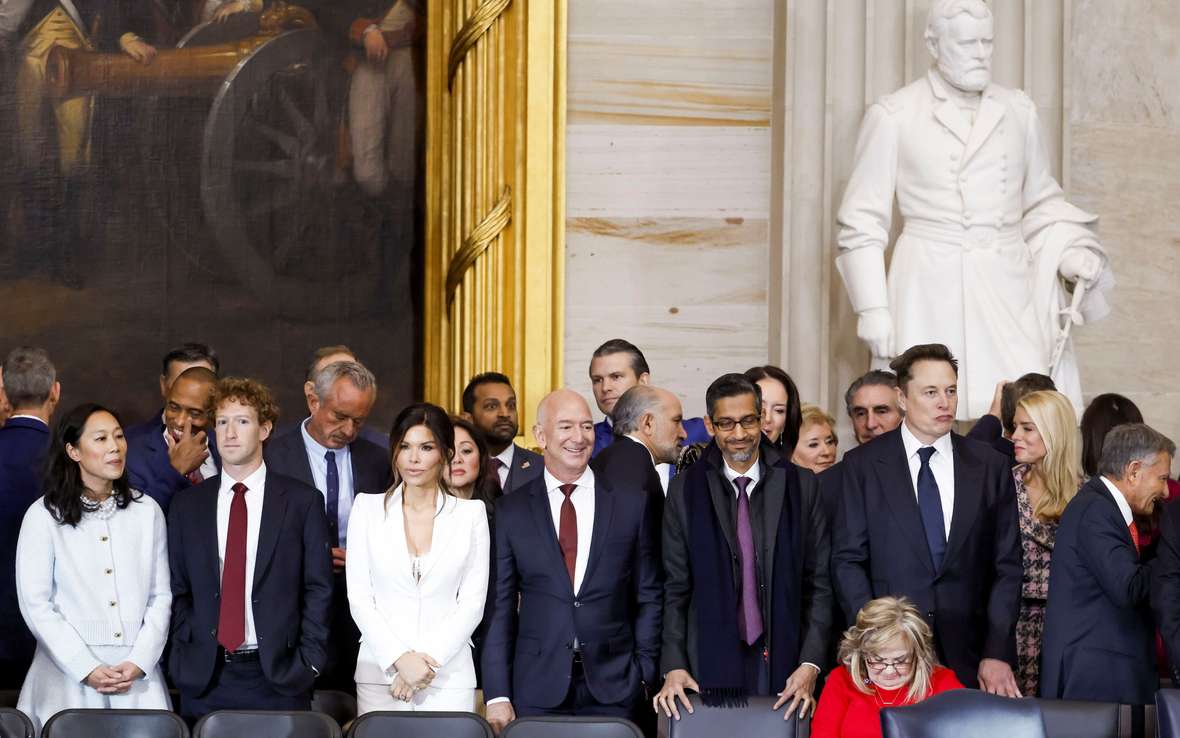The U.S. has entered a new era of corporate control and capture, spearheaded by the tech industry and the billionaire venture capitalists that fund it.
Perhaps never before in modern history has wealth been more concentrated in the hands of a few corporations and the billionaires at their helm. There is no industry in which this dynamic is more pronounced than the tech industry, with its titans of tech financing known as venture capitalists. In part I of this series, we focused on how those companies and billionaires are trading their wealth and power to control social media and communication platforms, directing and dictating the message that reaches the voting public. Now, we’ll look at this corporate capture of not only our elections but the institutions of our very democracy itself. Read on to learn more about the who’s, how’s and why’s of this new form of corporate control.
Who?
So, who exactly are these venture capitalists funding this corporate capture? They and their allies now occupy powerful roles in government or otherwise exert significant influence over U.S. President Donald J. Trump. Among them, three particularly powerful allies are helping shape key policy and advising on staffing decisions in the new administration: David Sacks, a tech investor, advises the president on AI and cryptocurrency; Peter Thiel, a longtime Trump supporter, has provided the administration with at least 10 of his former co-workers, employees or investing partners — including Vice President JD Vance; and, up until May, Tesla and SpaceX CEO and founder Elon Musk who led the newly formed “Department of Government Efficiency.” Their allies and employees now occupy the halls of government that oversee, regulate and award business to these men’s companies, creating an expansive web of potential conflicts. In this way, these folks have gained unprecedented and unusual influence in charting the course of the future of technology under the current administration.
How?
The trend of corporate lobbying as an extension of the growth in corporate power and control is perhaps more pronounced within tech than any other sector. In 2022 for example, the two companies with the highest lobbying expenditures were tech companies. And the industry appears to be getting its money’s worth. The trend has only grown in the last three years with the AI surge:
“OpenAI began to lobby in 2023, spending $380,000, as Washington began to seriously consider ways to regulate the industry. The company has already more than quadrupled its lobbying effort, spending $1.8mn in the first half of 2025 to influence the White House and Congress.”
Even where policymakers have been bold enough to begin to hold information and communication companies accountable for their business models (primarily in the EU to date), the regulations introduced are still quite new and some question how effective their enforcement mechanisms will be. It’s increasingly obvious that a handful of large and powerful multinational corporations control most of the digital ecosystem. But behind those few corporations is an even smaller group pulling the strings: venture capital funds.
During the 2024 US general election alone, the venture capital industry’s employees donated more than $283 million, about three times the amount spent in 2020, much of which went to crypto-supporting candidates. The 2024 US election saw a shift of power to a right-wing front of Silicon Valley—called the techno-authoritarians or the tech right—who reportedly influenced the selection of J.D. Vance, a one-time venture capitalist himself, for vice president. Those the likes of Andreessen Horowitz co-founders Marc Andreessen and Ben Horowtiz, David Sacks of Craft Ventures and Keith Rabois of Khosla Ventures joined Peter Thiel to become some of the larger supporters to Trump. These were followed by large multinational corporations making donations to his inauguration and include companies such as Amazon, Meta, Alphabet (Google), Microsoft and Uber.
Most recently, Silicon Valley firms announced more than $100 million in donations to pro AI political action committees and organizations ahead of rhetoric 2026 mid-term elections.
Why?
Because it works: once in office, electeds seem more than willing to please their benefactors. As a result, it’s particularly easy to understand why tech titans invest their billions in buying candidates for public office since it’s a decades-old story.
But in the age of AI there is new motivation driving these monied interests: less regulation of online platforms and AI. And it appears these oligarchs are getting their money’s worth. President Trump issued an executive order in January soliciting industry suggestions to create policy to “sustain and enhance America’s global A.I. dominance” and in August revealed as a product of that process an “AI Action Plan.” The Trump administration is using global trade wars to advance the interests of the U.S. tech sector and in particular the AI sub-sector, seeking to prevent foreign countries from imposing new taxes, regulations and tariffs on American tech companies and their products.
Private equity, particularly venture capitalists also have their own horse in this race to turn extreme wealth into political power. In August, the White House issued an executive order directing the Department of Labor to allow alternative assets such as VCs to access retirement accounts like 401Ks. This directive implies that 401Ks could now be invested in alternative assets—complicated financial instruments that can be highly speculative, opaque, risky, expensive, illiquid, and non-transparent—potentially endangering the savings of everyday Americans.
Elsewhere, tech companies and venture capitalists are lobbying the administration to block state AI laws and essentially give them free reign to utilize copyrighted material, federal data, and boundless energy—not to mention the massive tax breaks, grants and other incentives they’re after.
It’s clear that those close to Trump are reaping huge benefits that favor their business interests. Companies founded, owned or invested by many of Trump’s backers have won more than a dozen federal contracts since President Trump’s inauguration, and are pursuing billions more. Further guardrails and/or investigations on these companies are unlikely to make any headway as investigations have been closed or staff probing or overseeing those firms have been cut.
Most recently, the Trump administration has instructed U.S. diplomats in Europe to launch a lobbying blitz against the European Union's Digital Services Act, a critical piece of legislation for protecting against algorithmic amplification of disinformation and dangerous online content.
What does all this mean?
Companies, investors, and corporate billionaires are increasingly exploiting government for their own private gain. They have leveraged their substantial financial resources to shape policy, influence elections, and secure positions of power within the government. This has enabled them to create conditions favorable to the companies they run and/or invest in and further enrich themselves, at the expense of workers, consumers and society at large. Nowhere is this more pronounced than in the heavily shrouded and opaque world of venture capital—a world in which billionaire investors are now effectively buying the politicians and policies which will provide the most favorable regulatory climate for their businesses. And that climate, it seems, is one with virtually no regulations at all. In exchange, the rest of us are stuck with whatever government these oligarchs have bought and paid for.



